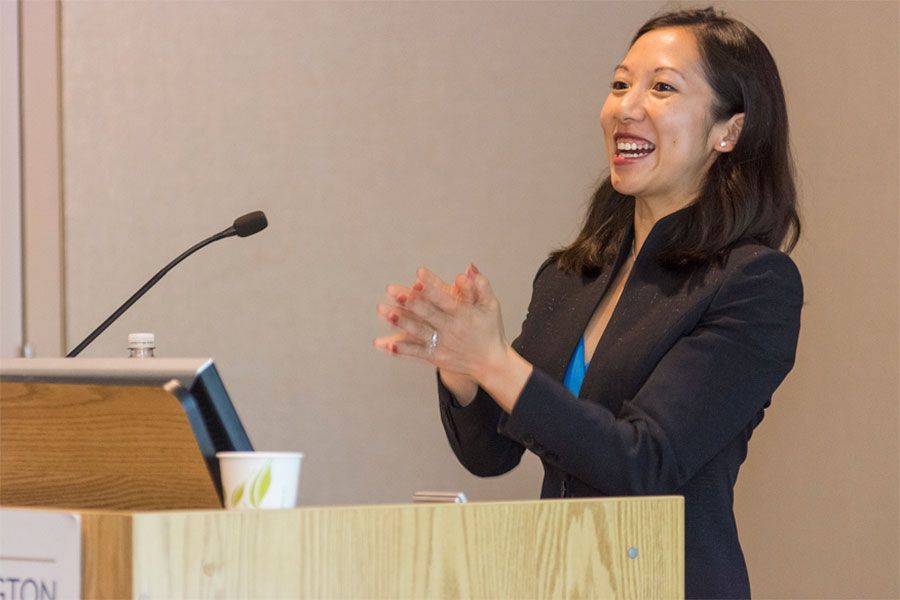
At the opening of the 9th Annual Alpha Omega Alpha (AΩA) Grand Rounds Lecture, Leana Wen, M.D., offered a very simple, frank pronouncement, “Everything is about health.”
In describing the pressures of her new career, Wen, who served as director of patient-centered care research and assistant professor of emergency medicine at the GW School of Medicine and Health Sciences before accepting an appointment from Baltimore Mayor Stephanie Rawlings-Blake to become Commissioner of Health, told the standing room-only crowd of students, residents, faculty, and family assembled in the GW Hospital auditorium that regardless of the topic, when it comes to public service, you’re talking about health.
“If you talk about education, how can kids learn if they aren’t healthy?” she asked. “If you care about criminal justice or jobs, you’re talking about health, too.” The problem, she continued, with attributing health care with so many other issues is that people start looking to the Department of Health as the antidote for all of the community’s ills. “People start emailing us to say that potholes are a public health issue, so fix my street.”
Wen, a unanimous choice by the M.D. program students to be this year’s AΩA Visiting Professor, focused the majority of her discussion on the events that led her to leave, “for now,” a life that she loved — teaching, researching, and practicing clinical medicine — to lead the Baltimore City Health Department.
Looking back on her days as an emergency medicine resident, Wen pinpointed a particular incident. “When you’re in emergency medicine, it’s not good when you get to know your patients over time.”
In Wen’s case, she had a patient during her residency training who stood out. The young woman was roughly the same age at the time, had been a competitive swimmer in college, and had experienced a series of painful back injuries resulting in several surgeries. Soon, she became dependent on prescription pain medication. “She began doctor-shopping to get more medications,” explained Wen, until eventually she was unable to find doctors who would prescribe the opioids her body so desperately needed. That is Wen’s patient made the switch to heroin.
It’s a scenario that has become quite common in this latest wave of addiction. In Baltimore, a city of 620,000, roughly 20,000 residents are regular heroin users, and according to Wen, 80 percent of today’s heroin users nationwide first began after abusing prescription opioids.
Over time, due to repeated emergency visits to the hospital, Wen got to know her patient and learned the woman’s story: how she lost custody of her children, was thrown out of her home, and became powerless to her addiction. “She came to me all of the time asking for help,” Wen recalled. “Actually, she came asking for addiction treatment. She came saying, ‘I know what I need. I want to get clean. I want treatment, please help me.’”
And each time, Wen was forced to turn away her pleading patient. “I would have to tell her, ‘I’m sorry, I can’t find you a bed today. I can’t even find you one tomorrow or the next day or the next day. Maybe I can find you an appointment in a few weeks or a few months.’”
According to the Substance Abuse and Mental Health Services Administration’s National Survey on Drug Use and Health, only about 11 percent of those with a drug problem are actually able to get treatment.
“Imagine if I said that for any other disease. Would anyone find that acceptable?” What if, Wen asked, only 11 percent of kidney disease patients were able to receive dialysis, or only 11 percent of cancer patients could get radiation or chemotherapy? “What if we told almost 90 percent of heart attack patients who came to the hospital, ‘I’m sorry, we don’t have a bed for you right now. Come back in a few weeks.’”
Finally, Wen and her colleagues in the department found the woman a spot in a drug treatment program. “She came back to me that same day,” recalled Wen. Despite getting the chance she craved, when Wen left the hospital that morning, the patient was in withdrawal. She went back to the streets, used heroin, and overdosed. By the time the paramedics brought her back to Wen, the woman was no longer breathing, and her heart wasn’t beating. “We tried to resuscitate her, and that time we couldn’t,” said Wen.
That experience stayed with Wen long after she had completed her residency. Throughout her clinical career, Wen became an ardent patient’s rights advocate and maintained an abiding interest in clinical public health. So when Baltimore Mayor Stephanie Rawlings-Blake offered her the chance to become the health commissioner in the winter of 2014-15, Wen accepted.
In just under a year and a half in office, Wen has already faced numerous challenges that have forced her to use all of her clinical expertise and personal creativity. Three months into her tenure, the city erupted following the death of Freddie Gray while he was in police custody. The ensuing protests and riots left large sections of the city in ruins. Wen directed the city’s public health recovery efforts, including ensuring prescription medication access and a Mental Health/Trauma Recovery Plan.
It’s Wen’s ambitious overdose prevention program, however, that has vaulted her into public health notoriety, and she recently appeared on a CNN Town Hall special as a leader the in the efforts to address the country’s growing opioid problem. In an effort to arm the city’s residents, or patients as she likes to think of them, with the power to rescue overdosing addicts, Wen wrote the city a prescription for the powerful opioid-blocking drug Naloxone.
“My proposition was, people are dying. Why can’t we get this medication into the hands of everyone in our city?” she explained.
Previously, Maryland law restricted physicians prescribing Naloxone only to addicts. However, a person experiencing an overdose is unlikely to be capable of self-administering the life-saving medication.
In 2015, Maryland Governor Larry Hogan Jr. signed into law a bill enabling Wen to issue a citywide standing order for Naloxone. She hopes that the bill will make it easier to get the anti-overdose medicine into people’s hands. The bill also expanded the scope of Good Samaritan, extending immunity to anyone who administers Naloxone to someone who is believed to be experiencing an opioid overdose.
“That’s pretty scary,” joked Wen, “to be writing a prescription for 620,000 people.”
In offering parting advice for graduating M.D. students in the audience, Wen had a simple message: don’t wait.
“Don’t wait for the perfect opportunity,” she said. “There is no perfect opportunity. I would never have realized that [commissioner of health] was my perfect opportunity.”


